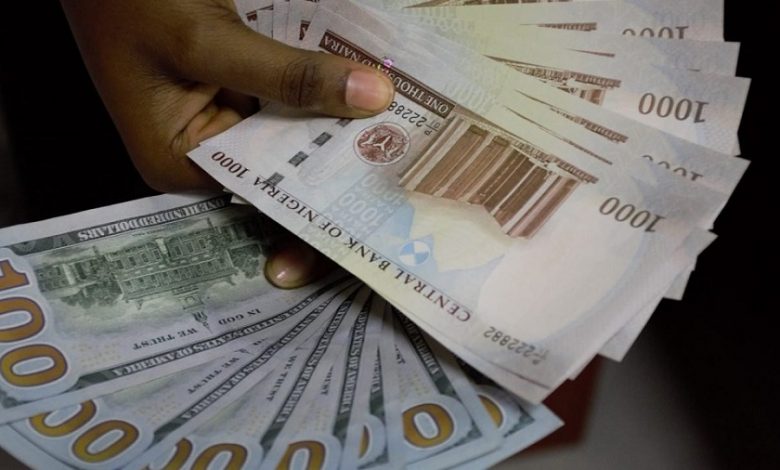What is the true value of the naira?

Operatives of the Economic and Financial Crimes Commission EFCC yesterday raided the offices of black market bureau de change merchants in a bid to halt the naira exchange rate that has been on the rise in recent times.
The naira has fallen by over N290/$1 year to date from an average of N565/$1 recorded as of 31st December 2021, currently trading as high as N860/$1 and still rising. This recent crash is being blamed on the announcement by the CBN that it planned to redesign the country’s larger denomination banknotes.
The CBN claims that this move was aimed to fight counterfeiting, inflation and insecurity. But it had the immediate unintended consequence of crashing the naira by almost N100/$ within a short period of the announcement. But this is only at the black market, the official rate remains relatively stable at around N443/$, and the CBN claims that the parallel market accounts for a tiny percentage of the country’s FX market anyways.
What determines the value of the naira?
To understand why the Nigerian naira is volatile, it is important to understand how fiat currencies around the world are valued. The value of modern fiat currencies is determined by two major factors – the supply and demand of the currency and the trust people and businesses have in the government issuing such a fiat currency.
Countries that produce and export high-value products and can attract wealthier tourists and investors will have a stable currency because there will be high demand for their local currency as in exchange for the goods they are exporting. Tourists will equally drive the demand for local currencies to shop and visit places. These factors stabilize the local currency, which is not available in Nigeria, the country imports almost everything it needs and only exports crude oil which makes up over 80% of foreign exchange earnings. The fact that the country imports more than it exports create excess demand for dollar for importation and not enough supply from exports.
The other factor that keeps a currency stable is the trust in the government that issues it. The US dollar is strong because people trust the American government to always protect their economy, they trust the government’s economic and monetary policies. In Nigeria, people blame the CBN governor and the federal government for all the country’s economic woes. And for good reasons, policies like stopping the sale of forex to bureau de change operators, and closing the border without proper alternatives have hurt the economy in recent years. Most investors and high-net-worth individuals look at such poor policies and move their capital outside the country which further hurts the value of the naira. As long as currencies are not pegged to anything real like gold, silver or any other rear earth metals, their values will always be intrinsic and determined by what people are willing and able to pay for it at the moment.
What is the true value of the naira?
Nigerians don’t produce and export much of anything valuable to earn forex, and the trust in the government’s monetary policies is very low, this translates to, the true value of the naira is simply the amount each individual is willing and able to pay for it at any moment.
The CBN’s claim that only a small percentage of the country’s forex transactions go through the black market is flawed, because of the over N300/$ difference between the black market and the official market, this means that most individuals and companies who bring dollar inflow into the country use the black market to process their money. Furthermore, the CBN’s interventions in Form A and Form Q, which aim to sell dollars directly to Nigerian travellers and importers have not been very successful. Due to congestion and technical problems, most people who attempt to use these schemes often end up sourcing their dollars on the black market.
The official exchange rate of N443/$ is a subsidy on forex that the government is paying in an attempt to keep the naira stable. The government uses dollars it earns from oil exports to fund this subsidy, which is why it has run into all sorts of trouble in the last few years. First, the CBN stopped the sale of forex to bureau de change merchants, then it limit spending on naira cards to $100 and now to $20 per citizen per month. The CBN also introduced Form A and Form Q to sell dollars directly to citizens who can prove that they have a legitimate need for it.
The true value of the naira is the black market rate that is determined by supply and demand, the official rate is a subsidized rate that is not sustainable which is why accessing it to process schemes like Form A and Form Q is always problematic.
Bottomline
Modern fiat currencies are not backed by real things like gold, silver or other rare earth metals, their values are mostly determined by the demand and supply of how much people are willing and able to pay for them at the moment, and the trust individuals and businesses have in the government issuing the currency.
In Nigeria, the value of the naira is crashing because the country is not exporting valuable items and attracting tourists. This creates excess demand for dollars from importing almost everything and not enough supply to keep up due to a lack of valuable export goods. The CBN is trying to mitigate this crisis by selling dollars directly to citizens, but it does not have enough supply to keep up with the demand.
